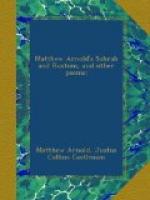HUMAN LIFE
=4. kept uninfringed my nature’s law.= That is, have lived a perfect life.
=5. inly-written chart.= The conscience.
=8. incognisable.= Not to be comprehended by finite mind.
=23. prore.= Poetical word for prow, the fore part of a ship.
=27. stem.= Consult dictionary.
What important incident in the destiny of the soul is alluded to in stanza 1? Interpret ll. 13-14, and apply to your own experience. Why cannot we live “chance’s fool”? Is there any hint of fatalism in the poem, or are we held accountable for our own destiny?
ISOLATION
TO MARGUERITE, ON RETURNING A VOLUME OF THE LETTERS OF ORTIS
This poem, the fifth in a loosely connected group of lyrics, under the general name Switzerland, is a continuation of the preceding poem, Isolation—to Marguerite, and is properly entitled, To Marguerite—Continued. When printed separately, the above title is used.
Jacopo Ortis was a pseudonym of the Italian poet, Ugo Foscolo. His Ultime Lettere di Ortis was translated into the English in 1818.
[187] =1. Yes!= Used in answer to the closing thought of the preceding poem.
=7. moon.= Note the frequency with which reference to the moon, with its light effects, appears in Arnold’s lines. Can you give any reason for this?
=24.= Mr. Herbert W. Paul, commenting on this line, says: “Isolation winds up with one of the great poetic phrases of the century—one of the ‘jewels five (literally five) words long’ of English verse—a phrase complete and final, with epithets in unerring cumulation.”
Give the poem’s theme. To what is each individual likened? Discuss l.2 as to meaning. In what sense do we live “alone,” l.4? Why “endless bounds,” l.6? How account for the feeling of despair, l.13? Answer the questions asked in the last stanza. In what frame of mind does the poem leave you?
KAISER DEAD
APRIL 6, 1887
Arnold’s love for animals, especially his household pets, was most sincere. Despite the playful irony of his poem, there is in the minor key an undertone of genuine sorrow. “We have just lost our dear, dear mongrel, Kaiser,” he wrote in a letter dated from his home in Cobham, Kent, April 7, 1887, “and we are very sad.” The poem was written the following July, and was published in the Fortnightly Review for that month.
=2. Cobham.= See note above.
=3. Farringford,= in the Isle of Wight, was the home of Lord Tennyson.
=5. Pen-bryn’s bold bard.=
Sir Lewis Morris, author of the Epic of Hades,
lived at Pen-bryn, in Caermarthanshire.
[188]
=11-12.= In Burns’s poem, Poor Mailie’s
Elegy, occur the following lines:—




